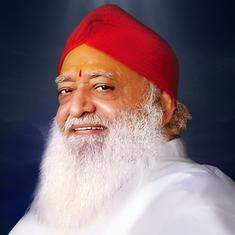In an op-ed piece in the August 15 issue of the Indian Express, Bharatiya Janata Party national spokesperson Ram Madhav disappointed by making a triumphalist ideological argument based on electoral victories.
On a day marking the 70th anniversary of Indian Independence, more was expected from the national spokesperson of the ruling party that claims to be the largest political party in the world.
There is a textbook certainty about fundamentalists speaking about fundamentals. Their diagnosis appears certain but their certainty is a bowdlerised reality. It has a tutorial college simplicity like a Charles Lamb imagining he is summarising Shakespeare. The use of cliché and stereotype is fascinating.
There was a celebration in Madhav’s opening paragraph that all the high constitutional positions – the president, vice president, prime minister – are occupied by leaders belonging to “the same ideological fraternity”. He celebrated the fact that they are all from humble backgrounds and then took a logical leap when he sought to equate the entire Opposition with representing the affluent classes, arguing that the BJP will serve the poor and the Opposition the rich.
Other than being a self-serving claim, this class difference of affluence versus humility is a fake opposition, which assumes a rich man cannot understand the poor. It makes people captive to their social backgrounds. It suggests that the poor can suffer but the rich are incapable of generosity or sacrifice. It is this mechanistic idea of social science that Madhav offered as part of the certainties of the BJP era.

Comic-book nationalism
Madhav adds that this change in social backgrounds is linked to an ideological shift to the right. Yet what he calls “the conservative right” includes Swami Vivekananda, Anne Besant and Mahatma Gandhi. There is a radicalism to the last two that a Rashtriya Swayamsevak Sangh ideologue like Madhav cannot comprehend. Besant’s socialism and her feminism were also part of her search for a just society. Clubbing her with Vivekananda makes a mess of history and creates a comic-book nationalism.
There is a radicalism to Gandhi’s Hind Swaraj that matches Thomas Paine’s Rights of Man or Karl Marx’s Communist Manifesto. There is an essentialism to Madhav where he sees the Indian genius as almost genetic. He does not see India as a confluence of civilisations, of religions growing on a culture which has a genius for dialogue. He confuses nation state with civilisation. His certainties reveal their superficiality.
Worse, Madhav equates – and this must be a new BJP fashion – India with Israel. His models of countries which understood native wisdom are Kemal Ataturk’s Turkey, Mao Zedong’s China and David Ben-Gurion’s Israel. Ataturk was a Western moderniser to the core and Madhav has no idea of the social cost of the Cultural Revolution. He uses “native genius” as a magic term without realising that these countries had complex histories. Israel is almost racist about Jews from outside Europe and Turkey today is moving to a dictatorship.
Such is the expertise that also ventures to provide guidance to foreign policy.
Cultural confidence
There is a truth in Madhav’s claim that at one level Nehru represented the foreign and the new while Gandhi the viewpoint of native wisdom. But Madhav underestimates Gandhi’s openness to influences such as John Ruskin, Henry David Thoreau, Anna Kingsford or Leo Tolstoy. Madhav reads the West as a monolith, while Gandhi had a shrewd sensitivity to the other west of defeated and alternative possibilities. But there is a more important mindset, a cultural confidence that Madhav ignores. It was a point made brilliantly by the author UR Ananthamurthy and the poet AK Ramanujan. It is about the locus of interpretation.
Ramanujan said there were two ways of looking at power and hegemony of the colonial kind. He explained it in terms of the metaphor of the house. The frontyard, he said, was official, western, even governmental. The backyard, he said, was the source of intimacy, storytelling. Frontyard and Backyard was the models that India used to fight the West. It was not the centre-periphery model that Madhav is rooted in. Frontyard intellectuals were people like Nehru and Jinnah. The backyard belonged to Gandhi, Tagore, the Bhakti movement. It was more playful in its domestication of the other.
In fact, our “native genius” had a more playful attitude to power than the BJP. The BJP turns nationalism into a grim science of certainty, forgetting the playfulness of the Indian genius. Madhav sounds more like a western ideologue or Jesuit than the local sages he claims to talk about. It is true that western liberal discourse had very little Indian content. But how Indian is the BJP advocating 19th Century western nationalism, positivist science and western development? Madhav uses a dismissive acronym for the Congress. He calls them LINOs – “liberals in name only”. One wishes this debate went beyond name calling, else it would easily descend to the other side calling Madhav and his group as IINOs, or Indian in name only.
The tragedy is that Madhav’s op-ed has to be taken seriously because it stems from the corridors of power. The pity is that as a piece of scholarship or political argument, it is worse than a third-rate undergraduate tutorial. The ideologues of the BJP could do with a course in nationalism and India’s pluralistic genius. Will some University rise to the challenge?
Shiv Visvanathan is a social science nomad.










